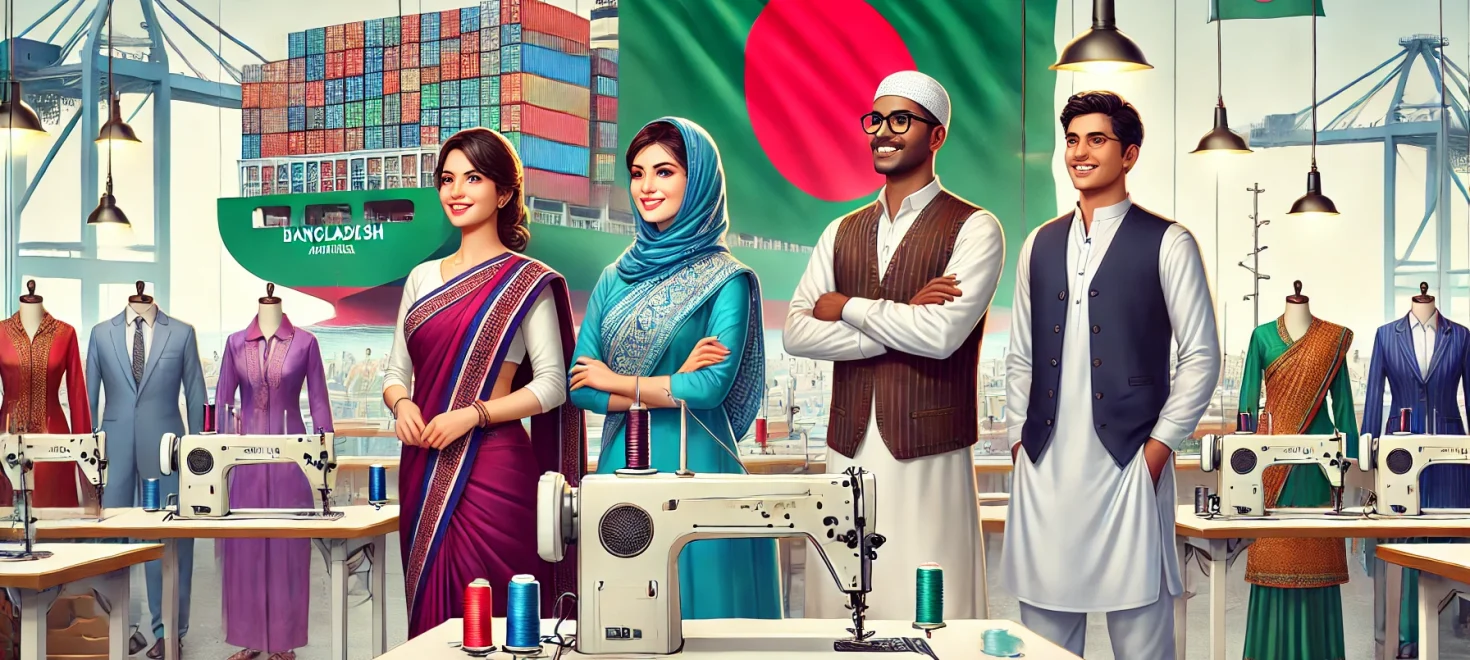Introduction
The Ready-Made Garment (RMG) industry is crucial to Bangladesh’s economic growth, driving exports and providing millions of jobs. Empowering women through Gender Equality and Social Inclusion (GESI) initiatives is not only the right thing to do but also a game-changing opportunity. This article explores how empowering women can transform the industry’s future and foster a more inclusive environment.
Overview of the RMG Industry in Bangladesh
Bangladesh’s RMG industry is one of the largest globally, employing over 4 million workers, 80% of whom are women. This sector has been crucial in reducing poverty and driving economic growth, contributing over 80% of the country’s exports, with continued growth expected.
Importance of Gender Equality and Social Inclusion (GESI) in the Garment Sector: GESI initiatives are crucial for the RMG industry’s future. A gender-inclusive workforce drives productivity, innovation, and business success. Empowering women through training and safe conditions benefits both employees and employers, enhancing global competitiveness.
The Role of Women in Bangladesh’s RMG Industry
Historical Contribution of Women to the RMG Sector: Women have been crucial to Bangladesh’s rise as a leading garment exporter. They make up the majority of workers, especially in roles like sewing, packing, and quality control, providing affordable labor that sustains the country’s competitive edge in the global market.
Current Gender Dynamics in the Workforce: Despite women’s significant contribution, gender dynamics in the industry remain imbalanced. They are often in low-paying, low-skilled roles with limited career advancement, facing wage gaps, restricted training access, and lack of representation in decision-making, hindering their full potential.
Barriers Faced by Women in Garment Factories
Women working in Bangladesh’s garment factories face several barriers, including:
Wage Disparities: Despite performing the same tasks as their male counterparts, women often receive lower wages. This wage gap is a result of traditional gender roles, where men are seen as the primary breadwinners, and women’s work is undervalued.
Harassment and Unsafe Working Conditions: Many women report facing sexual harassment and unsafe working environments, especially in factories that do not have strict policies or enforcement against such behaviours.
Limited Opportunities for Advancement: The absence of mentorship programs, training initiatives, and leadership development opportunities for women limits their career progression. Women are often stuck in low-level, manual jobs with little chance to move up the ladder.
Family Responsibilities: Women workers, especially those in rural areas, often bear the brunt of household responsibilities, which limits their work hours and career flexibility. The lack of supportive work-life balance policies exacerbates this issue.
The Business Case for Gender Equality
Enhancing Workforce Productivity through Diversity: Despite women’s significant contribution, gender dynamics in the industry remain imbalanced. They are often in low-paying, low-skilled roles with limited career advancement, facing wage gaps, restricted training access, and lack of representation in decision-making, hindering their full potential.
Reducing Turnover and Improving Retention Rates: Gender-inclusive policies, such as fair wages, career advancement, and family-friendly practices, improve retention. In Bangladesh’s garment industry, offering equal opportunities and better conditions for women can reduce turnover and create a more stable workforce.
Attracting Global Buyers by Adhering to GESI Principles: Global consumers and brands like H&M, Zara, and Uniqlo are prioritizing gender equality and fair labor practices. By adopting GESI principles, Bangladesh’s garment factories can attract more international buyers and enhance their global competitiveness.
Strategies for Implementing GESI in RMG
Workforce Training and Development: Upskilling Women in Technical and Leadership Roles: To address gender imbalance in leadership, RMG factories should offer targeted training in technical skills like machine operation, quality control, and management. This will empower women and enhance overall productivity.
Promoting Career Advancement Opportunities: Factories should establish clear career progression pathways, including mentoring, leadership development, and gender-neutral promotion criteria. By equipping women with the tools to advance, factories can build a more inclusive and productive workforce.
Creating a Safe and Inclusive Work Environment: Preventing harassment through zero-tolerance policies and gender equality training ensures a safe work environment. Gender-sensitive workspaces, like nursing rooms and tailored health measures, boost morale.
Childcare and Family Support Initiatives: On-Site Childcare: Providing childcare services helps female workers balance family and work, improving job satisfaction and retention. Flexible Hours & Parental Leave: Offering flexible hours and parental leave supports women in managing work and family responsibilities, encouraging workforce participation.
Equal Pay and Employment Opportunities: Addressing Wage Disparities: Ensuring equal pay for equal work, regardless of gender, is crucial for gender equality in the RMG sector. Encouraging Women in Leadership: Actively promoting women to leadership and decision-making roles enhances gender equality and brings diverse perspectives to management.
Awareness and Sensitization Campaigns: Gender Equality Training: Regular gender sensitivity training for management and staff helps eliminate biases and promote women’s participation in the workforce. Community Outreach: Programs that challenge gender norms and raise awareness can encourage more women to join and succeed in the workforce.
“To break through this ceiling, we need strong leadership, institutional support, and a comprehensive, industry-wide approach—isolated efforts alone will not suffice.”

M.A. Jabbar
Managing Director, DBL Group
Measuring the Impact of GESI Initiatives
Key Performance Indicators (KPIs) for GESI Success: To assess GESI initiatives, factories can track gender diversity, skill development, productivity, retention, and advancement. Employee surveys can measure inclusivity, while long-term benefits can be evaluated through KPIs like efficiency, defect reduction, and workforce stability.
Case Studies: Factories Achieving Milestones in Gender Equality: Factories with structured GESI strategies have seen measurable success. Upskilling underrepresented groups boosted efficiency by 25%, while inclusive hiring practices improved the work environment, leading to better retention and reduced attrition.
Long-Term Benefits for Businesses and Communities: GESI initiatives boost workforce morale, productivity, and community ties through services like daycare and transportation. GESI-friendly factories align with international ESG standards, enhancing competitiveness and attracting global ethical brands.
Challenges in Achieving GESI Goals
Cultural barriers and a lack of awareness hinder the participation of underrepresented groups, especially in leadership roles. Limited resources and insufficient infrastructure for training and support further restrict workforce development. Smaller factories also face financial challenges in investing in GESI programs.
Groyyo Consulting specializes in integrating GESI frameworks within RMG factories, providing tailored support to address specific challenges in workforce development, policy alignment, and operational efficiency.
Customized Solutions for Workforce Training and Policy Development
Groyyo Consulting assists factories in achieving GESI goals through:
Workforce Assessments: Conducting comprehensive assessments to identify gaps in skill levels, gender balance, and inclusion barriers.
Tailored Training Programs: Designing training initiatives like “Training of Trainers” (ToT) and Lean Performance Improvement (LPI) programs to upskill underperforming operators.
Developing and Monitoring KPIs for Gender Equality: Creating measurable targets, such as diversity goals, retention metrics, and productivity improvements.
Assisting Factories in Achieving GESI Goals
Groyyo’s role includes:
Workforce Assessments: Identifying workforce imbalances and operational bottlenecks to develop targeted improvement plans.
Tailored Training Programs: Ensuring training initiatives cater to the diverse needs of the workforce, leading to sustainable growth.
KPI Development and Monitoring: Implementing tools to measure GESI progress, including workforce participation, leadership development, and productivity gains.
Conclusion
The Path Forward for Bangladesh’s RMG Industry: Integrating GESI principles is vital for the long-term sustainability of Bangladesh’s RMG industry. This includes investing in workforce training, raising awareness to address societal barriers, and implementing policies that promote equal opportunities for all workers.
Call to Action for Factory Owners and Industry Leaders: To build a sustainable and inclusive workforce, companies should adopt GESI frameworks as a strategic goal. This includes using workforce assessments, implementing training programs, and regularly measuring GESI progress to align with international standards and global market demands.
Groyyo Consulting offers expert support in implementing customized GESI strategies, including training programs and data-driven monitoring with KPIs to track progress. By partnering with Groyyo, factories can drive workforce empowerment, inclusivity, and positive transformation in the RMG industry.

Divya Mohan
General Manager (International Business)
divyamohan@groyyo.com


Leave a Comment